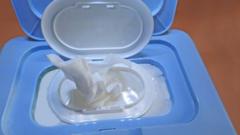Will Plastic Wet Wipes Disappear from Wales in 2026?

Understanding the Plastic Wet Wipes Ban in Wales: Implications and Benefits
In a significant stride toward environmental conservation, Wales has taken a bold step by voting to ban plastic wet wipes. This decision, passed unanimously in the Senedd, is set to take effect from December 2026, marking a pivotal moment in the fight against plastic pollution. The ban aims to reduce environmental harm caused by plastic and microplastic pollution, which has increasingly become a pressing concern.
The implementation of this legislation reflects a growing awareness of the adverse effects of plastic waste on our ecosystems. This article delves into the specifics of the ban, its implications, and the broader context of the movement toward reducing plastic use in daily life.
The Details of the Ban
The ban on plastic wet wipes is part of a larger initiative to tackle single-use plastics, following a law enacted in 2023 that prohibited various single-use plastic products. Here are the key aspects of the legislation:
- Effective Date: The ban will come into force in December 2026.
- Scope: It will be illegal to supply wet wipes containing plastic to consumers.
- Exemptions: Medical-grade wipes that contain plastic are exempt from the ban, as are wipes used for specific industrial purposes where alternatives do not exist.
- Transition Period: There will be an 18-month transition period to allow manufacturers to adapt their production processes.
Environmental Impact of Plastic Wet Wipes
Wet wipes have increasingly contributed to environmental degradation, primarily due to the plastic fibers they contain. Here are some key points about their impact:
- Sewage Blockages: Plastic wet wipes are notorious for causing sewage blockages. Janet Finch-Saunders, a Conservative Member of the Senedd, highlighted that they contribute to a significant number of blockages, leading to overspills and damaging local ecosystems.
- Microplastic Pollution: When disposed of improperly, wet wipes break down into microplastics, which can contaminate water bodies and harm marine life.
- Persistence in the Environment: Unlike their biodegradable counterparts, plastic wet wipes can take hundreds of years to decompose, leading to long-lasting pollution.
The Rationale Behind the Ban
Deputy First Minister Huw Irranca-Davies emphasized that this ban is not merely a regulatory change; it represents a paradigm shift towards sustainable practices. The rationale includes:
- Encouraging Innovation: The government aims to stimulate manufacturers and retailers to develop reusable and non-plastic alternatives, fostering innovation in product design.
- Consumer Awareness: By legislating against plastic wet wipes, the government seeks to raise awareness among consumers about the environmental impact of their choices.
- Long-term Vision: This legislation aligns with broader environmental goals, including reducing overall plastic waste and protecting biodiversity.
Industry Response and Adaptation
The transition period allows manufacturers to prepare for the ban. This phase is crucial for businesses to explore alternatives and adapt to new regulations. Here are some potential responses from the industry:
- Development of Alternatives: Companies may invest in research and development to create non-plastic wet wipes that still meet consumer needs.
- Consumer Education: Brands could focus on educating consumers about the environmental impacts of plastic and the benefits of switching to eco-friendly products.
- Collaboration: The ban encourages collaboration between manufacturers, environmental groups, and policymakers to find effective solutions.
The Broader Context of Plastic Use in Wales
The ban on plastic wet wipes is part of a larger trend in Wales and beyond, where governments are increasingly taking action against single-use plastics. Understanding this movement requires a look at several factors:
Global Movement Against Plastic Pollution
Many countries are implementing similar bans and regulations to combat plastic pollution. The global movement includes:
- International Treaties: Agreements such as the Basel Convention aim to regulate the transboundary movement of plastic waste.
- Community Initiatives: Local communities are organizing clean-up events and awareness campaigns to reduce plastic use.
The Role of Consumers
Consumer behavior plays a crucial role in the success of anti-plastic initiatives. Here are ways consumers can contribute:
- Choosing Reusable Products: Opting for reusable alternatives instead of single-use plastics can significantly reduce waste.
- Supporting Ethical Brands: Purchasing from brands that prioritize sustainability encourages more companies to adopt eco-friendly practices.
Conclusion: A Step Towards Sustainability
The decision to ban plastic wet wipes in Wales represents a significant advancement in the fight against plastic pollution. By taking concrete action, the Welsh government not only protects its environment but also sets an example for others to follow. As consumers, we have the power to influence change through our choices. By supporting sustainable products and practices, we contribute to a healthier planet for future generations.
Frequently Asked Questions (FAQs)
What types of wet wipes are banned in Wales?
The ban specifically targets plastic wet wipes supplied to consumers. Medical-grade wipes and those used for certain industrial purposes are exempt from the ban.
When will the ban on plastic wet wipes take effect?
The ban will come into effect in December 2026, with an 18-month transition period for manufacturers to adapt.
Why are wet wipes harmful to the environment?
Wet wipes contribute to sewage blockages, release microplastics into water systems, and take hundreds of years to decompose, leading to long-term environmental harm.
How can consumers prepare for the ban on plastic wet wipes?
Consumers can start by exploring reusable alternatives, such as washable cloths, and supporting brands that offer eco-friendly products.
The ban on plastic wet wipes in Wales is a significant development in the journey toward a sustainable future. As we navigate this crucial transition, it prompts us to reflect on our choices and the impact they have on the environment. What measures will you take to reduce plastic waste in your daily life? #PlasticBan #Sustainability #EcoFriendlyChoices
Published: 2025-06-19 11:34:05 | Category: wales



